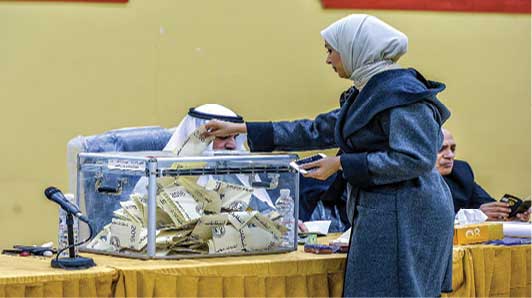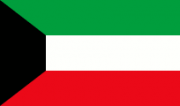
In 2016, we submitted to the UN Mechanisms 1 communications regarding 1 individual.

KUWAIT
 Our Concerns
Our Concerns
- Violations of the right to freedom of expression, notably through the enactment of the Law on Cybercrimes;
- Restricting political participation of persons convicted of defamation or blasphemy;
- Continued persecution of human rights activists, bloggers, journalists, and political opponents;
- Discrimination against the Bidun and the revocation of nationality as a means to punish political opponents.
 Recommendations
Recommendations
- Amend Law No. 78/2015 to limit the collection of DNA to criminal suspects only and ensure that the right to privacy is respected;
- Revise the electoral law barring individuals convicted of defamation and blasphemy from running for elections;
- Repeal and revise all laws restricting the freedom of opinion and expression and ensure they are in conformity with Kuwait’s international obligations under the ICCPR;
- End all forms of discrimination against the Bidun and put an end to the practice of revoking nationality.
 Upcoming
Upcoming
- Revision of DNA Law 78/2015;
- 15 July 2017: Submission of Kuwait’s follow-up report to the Human Rights Committee;
- 12 August 2017: Submission of Kuwait’s follow-up report to the Committee against Torture.
In 2016, due to the decrease in oil prices, Kuwait faced its first deficit in two decades, prompting the government’s decision to cut fuel subsidies. The decision spurred a national debate that resulted in several members of the Parliament opposing the government and ended with the Emir dissolving the Parliament on 16 October 2016. Elections for the 50 parliamentary seats were consequently held on 26 November 2016. A total of 454 candidates, including 15 women, registered to stand for election. The year also saw the return of major opposition figures, ending a four-year boycott initiated in response to the government’s prior decision to amend the voting system. However, the electoral committee banned around 50 candidates because of “court verdicts” or due to “uncompleted procedures”. A number of those disqualified candidates included members of the opposition who had previously been prosecuted and sentenced for having merely exercised their right to freedom of expression. Indeed, in June 2016, amendments were made to the electoral law whereby persons convicted of defamation or blasphemy would henceforth be barred from running for political office.
In 2016, Kuwait underwent reviews by two UN Treaty Bodies, namely the Human Rights Committee (HRCtee) and the Committee against Torture (CAT). During the review of the situation of civil and political rights, the HRCtee highlighted a number of issues pertaining to violations of fundamental freedoms, including discrimination against the Bidun – the stateless people – and the revocation of nationality as a means to punish political opponents. For its part, the CAT underlined the State’s lack of respect for the legal safeguards applicable from the onset of an arrest, the failure to investigate torture allegations, and the lack of adequate prevention and complaint mechanisms.

The DNA Law and violations of the right to privacy
In 2015, the Kuwaiti Parliament passed Law No. 78/2015, legalising the compulsory and indiscriminate collection of DNA samples from all Kuwaiti citizens, residents, and visitors alike. The law fixed a deadline of a year within which the DNA collection would have to be completed and stipulated that anyone who refuses to provide the authorities with a sample would be sentenced to “one year in prison and a fine of ten thousand dinars. Back then, the authorities described the law as a counterterrorism measure in response to an attack on a Shia mosque in June 2015. The Kuwaiti DNA Law, comprising 13 articles, is the first of its kind in that it indiscriminately requires all individuals to provide a DNA sample.
In its shadow report to the HRCtee, ahead of Kuwait’s review in June 2016, Alkarama denounced the potential dangers posed by this law and made a number of recommendations in order to safeguard the right to privacy of all individuals present in Kuwait. In its Concluding Observations, the HRCtee, echoing Alkarama’s recommendations, called on Kuwait to “revise its Law No. 78/2015 in order to limit the sample collection to individuals suspected of having committed serious crimes”. It further called on Kuwait to only allow for DNA collection upon orders from a competent judicial authority, to grant the possibility to “challenge the lawfulness of the request for DNA collection” and “set a time limit after which DNA samples will indefinitely be removed from the database”, and finally, to instate an independent authority to supervise and administer the DNA database so as to avoid the inappropriate use of data by the Ministry of Interior.
On 19 October 2016, the Kuwaiti Parliament announced that it would revise its DNA Law and bring it in line with the Kuwaiti Constitution, which protects the right to privacy. The Emir consequently requested that the Parliament reconsider the scope of the law, with the view of restricting the imposition of compulsory DNA collection to criminal suspects only, as opposed to all Kuwaiti citizens and residents, as initially envisioned.

The lack of an independent judiciary
Kuwait suffers from a severe lack of independence within the judiciary. Indeed, while the Constitution enshrines the separation of powers, it also states that the law is rendered by the Courts “in the name of the Emir”. Furthermore, the executive controls the appointment procedure of judges, who are appointed by Emiri decree on the basis of the Minister of Justice’s suggestions. Another issue lies in the fact that the Kuwaiti judiciary is, in part, composed of foreign judges, who are employed on a contractual basis and for a limited period of time.
This is in direct contradiction to the principle of irremovability of judges, which seeks to ensure their impartiality and independence. As such, the Minister of Justice can request foreign judges by name and can decide to extend their appointment after their contract has expired. In this context, the review of their performance and extension of their term is dependent on the Ministry of Justice, which has important control over them and thus compromises their independence.
Another aspect pertaining to the lack of independence of the judiciary is the system used to discipline judges. Indeed, every two years, an administrative body carries out an inspection that grades the performance of judges. However, the decision as to whether or not to refer the cases of judges scoring below average to the Supreme Court – which will ultimately decide on their dismissal – is left to the discretion of the Minister of Justice. Evidently, Kuwaiti law on the organisation of the judiciary clearly provides the Ministry of Justice with the power to supervise the judiciary.
In July 2016, echoing Alkarama’s concerns, the HRCtee recommended that Kuwait “guarantee the independence, autonomy and impartiality of the judiciary by reforming the system for the appointment, promotion and disciplining of judges and the security of tenure for foreign judges”.
The elements mentioned above raise questions about the integrity of the judiciary and its role in politicising certain cases. Indeed, the laws can be abused to prosecute those deemed undesirable by – or seen to be opposed to – the regime. This is exemplified by the case of Musallam Al Barrack, a former MP imprisoned for denouncing policies of the Emir.

NEW LAW ON CYBERCRIMES INFRINGES FREEDOM OF
EXPRESSION
In January 2016, Kuwait’s Law No. 63 on Cybercrimes came into force. The law restricts freedom of opinion and expression as its broad definitions can easily be used to punish peaceful opposition and dissent. The law punishes, inter alia, the online publication of information that “might prejudice public morality” or that criticises the Emir. Laws condemning criticism of the Emir or State institutions are contrary to the spirit of the International Covenant on Civil and Political Rights (ICCPR).
Alkarama underlined such violations of the freedom of expression in its shadow report to the HRCtee, recommending that these provisions be revised in order to bring them into conformity with Kuwait’s international obligations under the ICCPR. Alkarama also expressed its concern about the use of these laws to prosecute human rights defenders, journalists, or anyone else expressing criticism. It further denounced Kuwait’s Communications Act, which restricts basic freedoms, as well as the administrative decisions ordering the closing of a number of media outlets. In its Concluding Observations, the HRCtee reflected Alkarama’s concerns and recommended that Kuwait guarantee media freedom by ensuring that media outlets can operate independently and free from government interference. The HRCtee further recommended that any decision to shut down media outlets should come from an independent body that is subject to judicial review. In addition, Alkarama called on Kuwait to release and offer effective judicial redress to all persons imprisoned for having merely exercised their right to express their opinion.